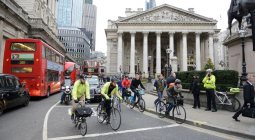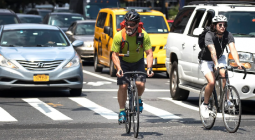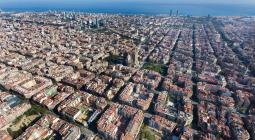Netherlands introduces car-free Sundays - archive, 1973.

For three months from November 1973, the Dutch government banned private motor vehicles on Sundays to curb oil consumption during the Opec energy crisis
Holland saddle-sore but fume free
Richard Norton-Taylor, Amsterdam
5 November 1973
The Dutch proved today that they could be as phlegmatic as the British ever were. As the government’s ban on Sunday driving came into force, motorways were abandoned, and queues at bus stops were long. Empty taxis were parked in rows at the ranks.
The Government’s initiative was widely welcomed, and it is not difficult to see why. At the busy crossroads where yesterday I waited an hour for a breakdown van to come and mend my car, the sound of bicycle bells and rusty – and not so rusty – wheels purring almost delicately took the place of angry drivers blowing their horns and impatiently revving their engines.
There were, of course, authorised exceptions to the ban apart from public transport; fire engines, ambulances, doctors, dentists, veterinary surgeons, foreign tourists, and tradesmen who had to get their food to markets, restaurants and hotels.
But in Amsterdam, still western Europe’s leading centre for hippies, it was entirely appropriate that the police in the best of faith allowed the bearded long-haired driver to take a group of foreign hippies on a tour of the city in his psychedelic bus. “It’s very nice, after all,” said the long-haired police corporal with his limited English.
The Dutch are also thrifty and by this evening only a dozen motorists In Amsterdam and a handful in The Hague had been fined for breaking the regulations. Television crews from Germany, Belgium, and Sweden were busy taking shots of middle-aged couples sharing a single bicycle taken from the back of the garage.

A cabaret group leader was less fortunate; he could take his equipment to another town for a show tonight, but the rest of his group had to go by public transport. A French couple who had hired a car with local number plates also expressed dismay when they were told that they had to walk – or use public transport.
But the police enjoyed recounting how they stopped a car at three this morning (when the ban came into force); the car drove off at speed, the police took to the chase and finally caught two Yugoslavs who had chosen just the wrong hour to steal a vehicle.
Under the emergency 1939 Distribution Law, which the government has reenacted, those who break the ban on driving can face fines of up to £17,500 or a maximum prison sentence of six years. However, police today were fining those few culprits they saw about £17.
Some Dutchmen were looking ahead to the heart of winter and potential cuts on domestic fuel consumption. They blamed the government for “provoking” the Arab oil producers into their boycott of the Netherlands by its reputedly pro-Israeli stand.
This is a land of countless cyclists – they enjoy priority on the roads and at junctions over cars. In addition there are an estimated six million mopeds as against three million cars. Yet as the standard of living rises, so car-driving is becoming a sport as in all other west European countries.
Perhaps the success of the government’s initiative today can be put down partly to what one Dutchman referred to as “the element of Calvinism” that still has a place somewhere in the souls of his countrymen. And those churchmen who still scorn any activity on the Sabbath could thank the Arabs for helping them in their task.
4 November 2020
The Guardian




